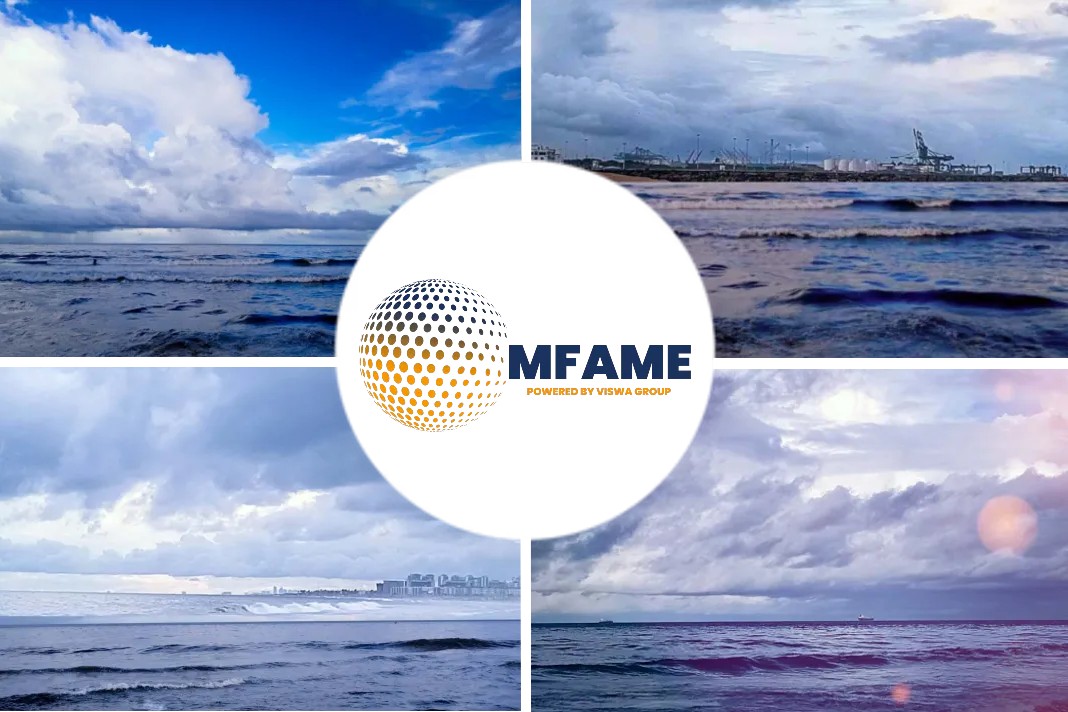Some 10 countries in the world remain unscathed by the coronavirus pandemic. But as the world falls apart they don’t know how to survive even though they aren’t infected.
BBC investigated how these countries are fighting to survive.
How The Virus Ravages the Economy
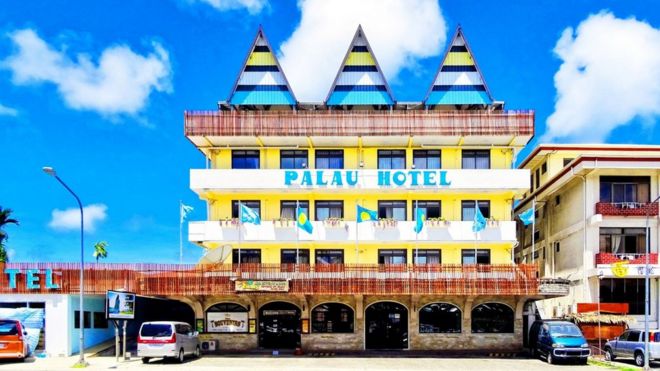
The Palau Hotel opened in 1982, before mass tourism but since then, this tiny nation, surrounded by the sky-blue Pacific Ocean, has enjoyed something of a boom.
In 2019, 90,000 tourists came to Palau, five times the total population. In 2017, IMF figures showed, tourism made up 40% of the country’s GDP.
But that was pre-Covid.
Palau’s borders have been, in effect, closed since late March. It is one of the only 10 countries in the world with no confirmed cases (counting only countries that are full UN members, and excluding North Korea and Turkmenistan).
Yet, without infecting a single person, the virus has ravaged the country.
The Palau Hotel has been closed since March, and it’s not alone. The restaurants are empty, the souvenir shops are shut, and the only hotel guests are returning residents in quarantine.

Countries with no recorded Covid-19 cases
- Palau
- Micronesia
- Marshall Islands
- Nauru
- Kiribati
- Solomon Islands
- Tuvalu
- Samoa
- Vanuatu
- Tonga
“The ocean here is much prettier than any other place in the world,” says Brian Lee, manager and co-owner of the Palau Hotel.
“It’s a small country, so local people won’t stay in Palau,” says Brian.
Struggling Empty Hotels
He has around 20 staff, and has kept them all on, albeit with reduced hours. “I try to find jobs for them – maintenance, renovation, and so on,” he says.
But empty hotels cannot be maintained and renovated for ever. “I can stay for another half-a-year,” says Brian. “Then I may have to close.”
Brian doesn’t blame the government, which has offered financial support to residents, and has, after all, kept the virus out.
“I think they did a good job,” he says. And yet, if Palau’s first hotel is to survive, something has to change soon.
The president recently announced that “essential” air travel could resume by 1 September. Meanwhile, an “air corridor” with Taiwan, which would allow tourists to visit, has been rumoured.
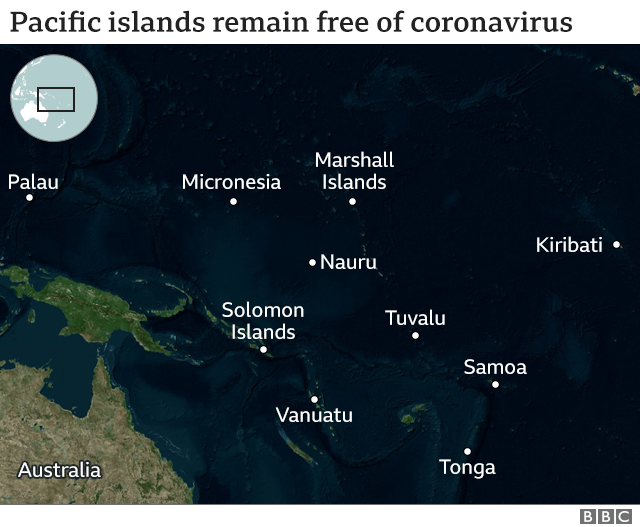
Can’t Survive
For Brian, it can’t come soon enough.
“I think they have to start reopening again – maybe have travel bubbles with New Zealand and countries like that,” he says. “Otherwise, no one can survive here.”
No Infection Doesn’t Mean No Impact
Some 2,500 miles (4,000km) east, across the vast Pacific Ocean, the Marshall Islands also remain Covid-free. But, like Palau, no infection does not mean no impact.
The Hotel Robert Reimers sits on a ribbon of land on the main atoll, Majuro, with a lagoon on one side, and ocean on the other. Before Covid, the 37 rooms had an occupancy rate of 75%-88%, with guests mainly from Asia, the Pacific, or “the Mainland” (the United States).
Since the borders closed in early March, that rate is has been 3%-5%.
“We’ve had a few coming from the outer islands,” says Sophia Fowler, who works for the hotel group. “But not a lot.”
Nationally, the country is expected to lose more than 700 jobs in the Covid downturn, the biggest fall since 1997. Of those, 258 will be in the hotel and restaurant sector.
But self-isolation affects more than tourism – and the Marshall Islands are much less dependent on holiday-makers than Palau. A bigger problem is the fishing industry.
To keep the country Covid-free, boats that have been in infected countries are banned from entering the country’s ports. Other boats, including fuel tankers and container ships, must spend 14 days at sea before entering. Fishing licences are unsold, and cargo flights have been cut.
The effect is clear. The Marshall Islands specialise in aquarium fish – the most popular is the flame angel fish – but exports fell by 50%, according to one US report.
The shore-based shipment of sashimi tuna fell by the same amount. Other fishing industries expect a 30% fall during the year.
In short, you can keep the virus out, but you can’t beat it. Covid-19 gets you one way or the other.
Sophia “hopes” things return to normal for the country, and Hotel Robert Reimers, next year. But if they don’t?
“Then it’s just not feasible for us,” she says.
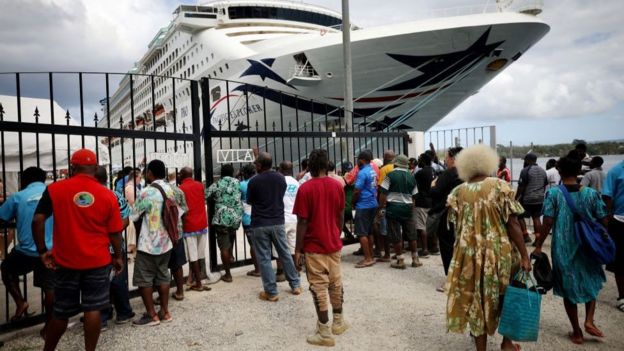 Image copyrightMARIO TAMA/GETTY IMAGES
Image copyrightMARIO TAMA/GETTY IMAGESDon’t Want Sickness, But Doomed Anyway
But while closing borders has made Covid-free countries poorer, not everyone wants them reopened.
Dr Len Tarivonda is the director of public health in Vanuatu, population 300,000. Though he works in the capital, Port Vila, he is from Ambae, an island of 10,000 people around 170 miles north.
“If you talk to them [in Ambae], the majority say keep the border closed for as long as possible,” he says. “They say: ‘We don’t want the sickness – otherwise we’re doomed, basically.’”
Some 80% of people in Vanuatu live outside towns and the “formal economy”, Dr Tarivonda says.
“And my observation is they don’t necessarily feel the pinch yet. They are subsistence farmers, they grow their own food – they depend on the local, traditional economy.”
Nonetheless, the country will suffer. The Asian Development Bank expects GDP to fall by almost 10% – Vanuatu’s biggest drop since independence in 1980.
That slump is not just down to Covid’s closed borders. In April, Tropical Cyclone Harold battered much of the country, killing three people and affecting more than half the population.
“We had a daily health emergency operation briefing,” Dr Tarivonda remembers. “First we would discuss Covid, then TC Harold. Two disasters going on at the same time.”
Yet Covid will have the longer-lasting impact.
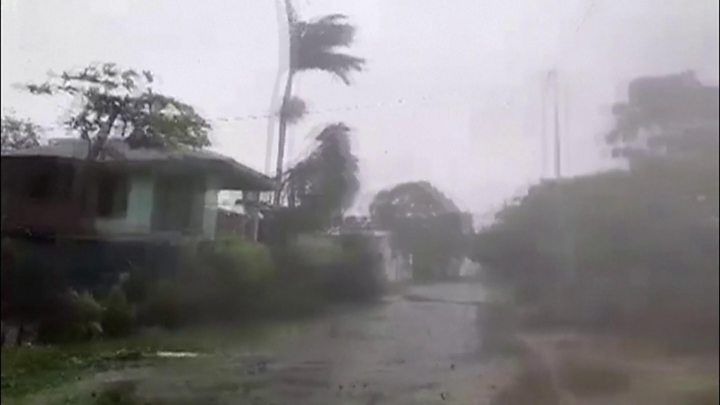
In July, the government announced plans to reopen the border to other “safe” countries by 1 September. Then cases grew in Australia, and New Zealand, and the plan was pushed back.
Dr Tarivonda, who sits on the border task force along with government, tourism, and airline officials, admits they are “almost back to square one”, with no new date for reopening.
Smaller, specific cross-border travel may help Vanuatu. The government recently allowed 172 workers to travel to the Northern Territory in Australia for six months to pick mangoes. While the remittances will help, they are not enough in a country where 35% of GDP comes from tourism.
But, despite that need for open borders, Vanuatu will not rush to reopen. Dr Tarivonda looks at Papua New Guinea, which was almost Covid-free until a sharp increase in late July, with concern.
“If the virus comes, it will probably be like wildfire – and what we are seeing in Papua New Guinea is a reflection of why we are worried,” he says.
“Given our [health care] limitations, the context we have in the Pacific, the best bet is to keep the virus out for as long as possible.”
What Can These Covid free Countries Do?
There are short-term measures, such as payments to workers and business. And there is one long-term measure: wait for a vaccine.
Until then, travel bubbles remain the best hope. Yet, as Rommel Rabanal from the Asian Development Bank points out, they sound simpler than they are.
“These arrangements have prerequisites,” he says. “A common set of testing standards, contact tracing, and quarantine facilities, in case outbreaks happen. They are under discussion but there has been slow progress – or perhaps cautious progress.”
And – as seen with Vanuatu’s “September plan” – the bubbles can burst quite easily, too.
“Australia and New Zealand have made it clear the first country they’ll test it with is each other,” says Jonathan Pryke, director of the Pacific islands programme at the Lowy Institute.
“And before that can happen, you need to remove community transmission. So I think the prospects of a travel bubble are off the cards for this year.”
Desperation Mounting in the Pacific Countries
Mr Pryke says that, as the months pass, the desperation is mounting in the closed-off Pacific countries.
He is, however, in no doubt that the only option for these countries was self-isolation on an international scale.
“Even if they kept their borders open, their major tourism markets of Australia and New Zealand wouldn’t be open, as they’ve locked down their own borders,” he says.
“So you would have the worst of both worlds – a health crisis and an economic crisis. We’re going to have years and years to look at what the right decisions were.
“But looking back, no one’s going to doubt that locking down was the right move by these Pacific nations.”
Did you subscribe to our daily newsletter?
It’s Free! Click here to Subscribe!
Source: BBC






